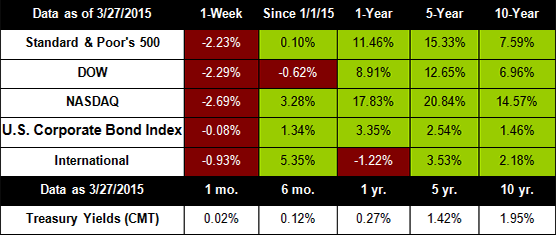Investors care about GDP reports because they provide the most comprehensive scorecard about the overall health of the economy. Since healthy economic growth helps boost corporate profits, over the long run, stock market performance tends to mirror economic performance. In the short term, as we have seen, markets can behave unpredictably even during periods of positive economic growth.
Digging deeper into the GDP data, we see that strong consumer spending, exports, and business investment were strong last quarter. However, the economy cooled because of higher imports and lower federal government spending.[6] Bottom line: The economy was fundamentally on very stable footing at the end of the year. Though we don't have first quarter GDP numbers yet, it's clear that the Fed feels comfortable enough about the economy to think about raising rates.
The holiday-shortened week ahead is packed with important economic data and marks the end of the first quarter. Analysts will be looking particularly closely at Friday's March jobs report, which will add fuel to the debate around when the Fed will raise interest rates. A report that shows healthy improvement in the labor market might signal that the economy is robust enough to withstand rate hikes. We expect markets to remain volatile going into earnings season as investors wait to see how U.S. companies did in the first three months of the year.
ECONOMIC CALENDAR:
Tuesday: S&P Case-Shiller HPI, Chicago PMI, Consumer Confidence
Wednesday: Motor Vehicle Sales, ADP Employment Report, PMI Manufacturing Index, ISM Mfg. Index, Construction Spending, EIA Petroleum Status Report
Thursday: International Trade, Jobless Claims, Janet Yellen Speaks 8:30 AM ET, Factory Orders
Friday: Employment Situation, U.S. Stock Market Closed

HEADLINES:
Consumer sentiment falls in March. A measure of confidence among U.S. consumers fell, indicating that Americans may be worried about their prospects this quarter.[8]
Existing home sales rebound less than expected in February. While sales rose last month, a persistent shortage of available properties restrained selling activity. Though warmer weather should boost sales, higher prices stemming from low housing inventory might curb buyers' appetites.[9]
Investing involves risk including the potential loss of principal. No investment strategy can guarantee a profit or protect against loss in periods of declining values.
Diversification does not guarantee profit nor is it guaranteed to protect assets.
The Standard & Poor's 500 (S&P 500) is an unmanaged group of securities considered to be representative of the stock market in general.
The Dow Jones Industrial Average is a price-weighted average of 30 significant stocks traded on the New York Stock Exchange and the NASDAQ. The DJIA was invented by Charles Dow back in 1896.
The Nasdaq Composite is an index of the common stocks and similar securities listed on the NASDAQ stock market and is considered a broad indicator of the performance of stocks of technology companies and growth companies.
The MSCI EAFE Index was created by Morgan Stanley Capital International (MSCI) that serves as a benchmark of the performance in major international equity markets as represented by 21 major MSCI indexes from Europe, Australia and Southeast Asia.
The Dow Jones Corporate Bond Index is a 96-bond index designed to represent the market performance, on a total-return basis, of investment-grade bonds issued by leading U.S. companies. Bonds are equally weighted by maturity cell, industry sector, and the overall index.
The S&P/Case-Shiller Home Price Indices are the leading measures of U.S. residential real estate prices, tracking changes in the value of residential real estate. The index is made up of measures of real estate prices in 20 cities and weighted to produce the index.
The 10-year Treasury Note represents debt owed by the United States Treasury to the public. Since the U.S. Government is seen as a risk-free borrower, investors use the 10-year Treasury Note as a benchmark for the long-term bond market.
Opinions expressed are subject to change without notice and are not intended as investment advice or to predict future performance.
Past performance does not guarantee future results.
You cannot invest directly in an index.
Consult your financial professional before making any investment decision.
Fixed income investments are subject to various risks including changes in interest rates, credit quality, inflation risk, market valuations, prepayments, corporate events, tax ramifications and other factors.

